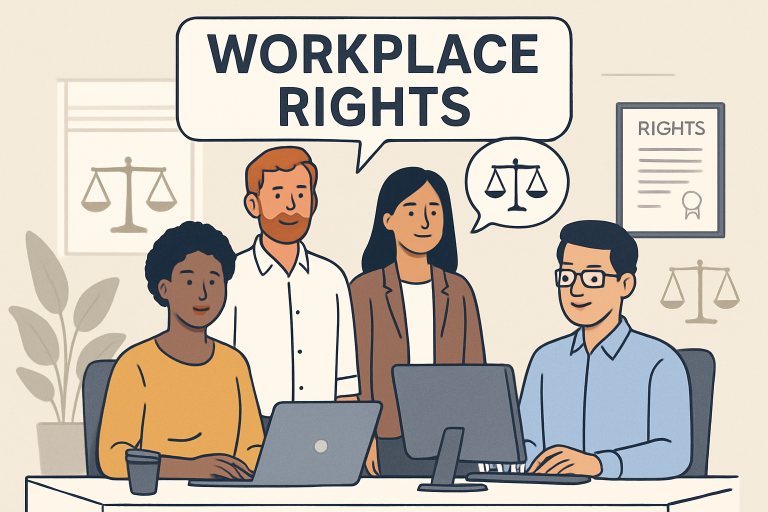Table of Contents
- Wage Theft
- Employment Discrimination
- Workplace Harassment
- Wrongful Termination
- Whistleblower Retaliation
- Privacy Concerns in Remote Work
- Misclassification of Employees
- Overtime and Break Violations
Awareness of your legal rights in the workplace is essential for every employee striving to protect their interests and ensure a fair employment environment. Whether you work in a large corporation, a small business, or a startup, understanding your rights equips you to challenge unfair treatment if it arises. Many common issues—ranging from wage disputes to discrimination—can have serious effects on both working conditions and an individual’s livelihood, sometimes leading to emotional stress, financial instability, or damage to career prospects. Employees in large urban centers, such as Los Angeles, in particular, may face complex situations where legal guidance is necessary, and consulting a Los Angeles employment lawyer can be crucial if you encounter potential violations. In fast-paced, diverse work environments, knowing when to seek outside help can make the difference between resolving an issue and letting it negatively impact your life.
Staying informed helps you recognize when your rights have been compromised, empowers you to address improper employer actions, and can even prevent costly mistakes. As the workforce adapts to changes like remote work, shifting economic pressures, and evolving anti-discrimination laws, understanding the most pressing legal workplace issues becomes increasingly important so you can act if you experience or witness misconduct. Being proactive in educating yourself not only benefits you but also your colleagues—sometimes a single voice can spark positive changes throughout a workplace. It is also worth noting that employment laws regularly change, so keeping up to date ensures you are better protected in any situation.
Wage Theft
Wage theft occurs when employers illegally withhold wages or employee benefits that are rightfully owed. This can include failure to pay overtime, requiring off-the-clock work, misappropriating tips, or paying below minimum wage. Such violations often go unreported, especially in industries like hospitality, food service, retail, construction, and agriculture, where workers may fear retaliation or job loss. In the United States, wage theft is rampant; annually, millions of workers lose billions of dollars to these schemes. Understanding timekeeping rules and paystub requirements can help employees recognize the signs of wage theft. If you notice discrepancies between the hours you worked and those reported, unpaid overtime, or if you’re pressured to waive breaks, these could be signs your employer is violating wage laws.
Employees should keep copies of pay stubs, timesheets, and correspondence related to scheduling or compensation. In some cases, workers who have been shortchanged can join class-action lawsuits or seek restitution from state or federal wage and hour divisions. Awareness and documentation are your strongest tools for recourse if you suspect wage theft has occurred, and knowing that agencies are available to help can encourage employees to take the necessary action.
Employment Discrimination
Workplace discrimination is illegal under federal law, but thousands of employees each year still suffer from unfair treatment based on race, gender, age, religion, disability, and, increasingly, gender expression and reproductive choices. Discriminatory practices can affect hiring, promotions, pay, work assignments, layoffs, and terminations. In 2024, the Equal Employment Opportunity Commission (EEOC) updated its guidelines to broaden protections, reflecting ongoing legal and cultural shifts around these topics.
If you suspect workplace policies or managers treat you unequally due to a protected characteristic, documentation and prompt action are crucial to building a case. Discrimination can sometimes be subtle, manifesting as exclusion from key meetings, being passed over for promotions, or unjustified criticism. Employees should keep a detailed record of incidents, as well as copies of performance reviews and emails that may demonstrate unequal treatment. Filing a complaint through your company’s Human Resources department is often a necessary first step, followed by contacting the EEOC or a state agency if the issue is not resolved internally. While the legal process can be slow and emotionally taxing, pursuing justice can protect your rights and also promote fairness for others.
Workplace Harassment
Harassment, including sexual harassment, bullying, and intimidation, can create a hostile and unproductive work environment. This problem is not limited to overt or dramatic actions—it may include repeated jokes, derogatory remarks, exclusion from meetings or professional opportunities, or other conduct that interferes with an employee’s ability to work. Recent high-profile cases in the tech and entertainment sectors highlight how pervasive these problems remain. Harassment can take the form of unwanted advances, offensive comments, or pervasive negative behavior that targets individuals or groups.
According to USA.gov, employees have the right to report workplace harassment and discrimination, and federal resources are available to help individuals file complaints or seek assistance. Employers are required to provide safe working conditions, and reporting mechanisms should be clear and accessible for all staff. Employees should familiarize themselves with their company’s reporting process, which is often outlined in an employee handbook, and know their right to escalate concerns to external agencies if needed. It is also important to document each incident, including dates, times, involved individuals, and witnesses, to build a strong case if necessary.

Wrongful Termination
Wrongful termination happens when an employee is fired in violation of labor laws or the terms of an employment contract. While most employment in the U.S. is “at-will,” meaning employers can terminate employees for any legal reason, legal protections exist for workers who are dismissed on illegal grounds, such as for reporting discriminatory practices or acting as a whistleblower. Wrongful termination can also occur if an employee is fired after taking legally protected leave—for medical reasons, family obligations, or jury service.
If you believe your dismissal was unfair or retaliatory, gathering documentation and consulting legal advice is your best course of action. Keep emails, performance reviews, communications with supervisors, and any documentation of complaints you filed. In addition, reviewing your employment contract—if you have one—may expose contractual violations by your employer. An employment attorney can advise you on potential claims, deadlines (known as statutes of limitations), and the evidence you need for a strong case.
Whistleblower Retaliation
Whistleblowers—employees who report illegal or unethical behavior within their organizations—are protected by federal and state laws. Unfortunately, retaliation, such as demotion, isolation, or firing, still occurs. This discourages individuals from coming forward, perpetuating workplace misconduct. Some employees may not even realize that whistleblower laws protect them in reporting issues such as safety violations, financial fraud, or discrimination.
Knowledge of relevant protections and proper channels for reporting can help shield you from retaliatory actions. Whistleblowers should report issues in writing, retain detailed records of all disclosures, and follow official procedures, as outlined in employer policies. If retaliation occurs, documenting each event in detail strengthens your legal standing. Legal remedies can include reinstatement, back pay, and punitive damages.
Privacy Concerns in Remote Work
The rapid rise of remote work has introduced new privacy concerns, including employer surveillance through software that monitors keystrokes, webcam feeds, or even location. Some employers require invasive always-on cameras or use monitoring apps that track the websites and applications employees use throughout the day. According to a 2024 study, more employees are expressing discomfort over the extent and invasiveness of monitoring practices. The increased use of personal devices for work purposes can blur the lines between reasonable supervision and privacy invasion.
Understanding your organization’s privacy policies and your rights is critical, particularly as remote work becomes ever more widespread. Workers should review any agreements they sign and inquire about the nature and purpose of workplace surveillance. If privacy boundaries are crossed, discussing concerns with management or HR and seeking outside legal advice may be necessary, especially given the evolving nature of digital workplace regulations.
Misclassification of Employees
Misclassification occurs when employers label employees as independent contractors to avoid paying benefits and taxes. This can significantly affect your access to overtime pay, health insurance, sick leave, unemployment benefits, and retirement contributions. Some employers use misclassification as a cost-cutting strategy, but it is illegal and subjects them to fines and legal action. Misclassified workers are often expected to bear business costs, lack access to worker protections, and may struggle to access workers’ compensation or unemployment benefits.
Both federal and state governments are intensifying efforts to penalize employers who misuse these classifications, making it vital for workers to understand the implications of their employment status. If you receive a 1099 form instead of a W-2, yet work under direct supervision and have set hours, your classification may be incorrect. Employees should educate themselves about employment tests (such as the “ABC” or “economic realities” test), track their job duties, and seek legal advice if they have concerns.
Overtime and Break Violations
Employers are legally obligated to compensate eligible workers for overtime and to provide required meal and rest breaks in accordance with state and federal laws. Frequently, violations occur when workers are misclassified, asked to work off the clock, or discouraged from taking legally mandated breaks. Such rules are especially important for hourly workers or those in physically demanding jobs, as missed breaks can harm both well-being and productivity.
Violations not only harm employees financially but also undermine health and morale. Regularly reviewing your time records and understanding the rules that apply to your job type are practical steps to ensure your rights are protected. If you believe you have been denied overtime or breaks, document the dates and hours worked, and report the matter to your HR department or a regulatory agency if necessary. Understanding your rights can help you recover lost wages and improve your workplace for everyone.
By staying informed about these common workplace legal issues, employees can recognize problems, assert their rights, and know when to seek legal assistance. If you find yourself facing any of these situations, gathering detailed records and considering a conversation with an employment attorney can make all the difference in obtaining justice and protecting your career. Remember, advocating for yourself in the workplace doesn’t just benefit you—it sets a precedent for others and strengthens the culture of accountability and fairness at your organization.




